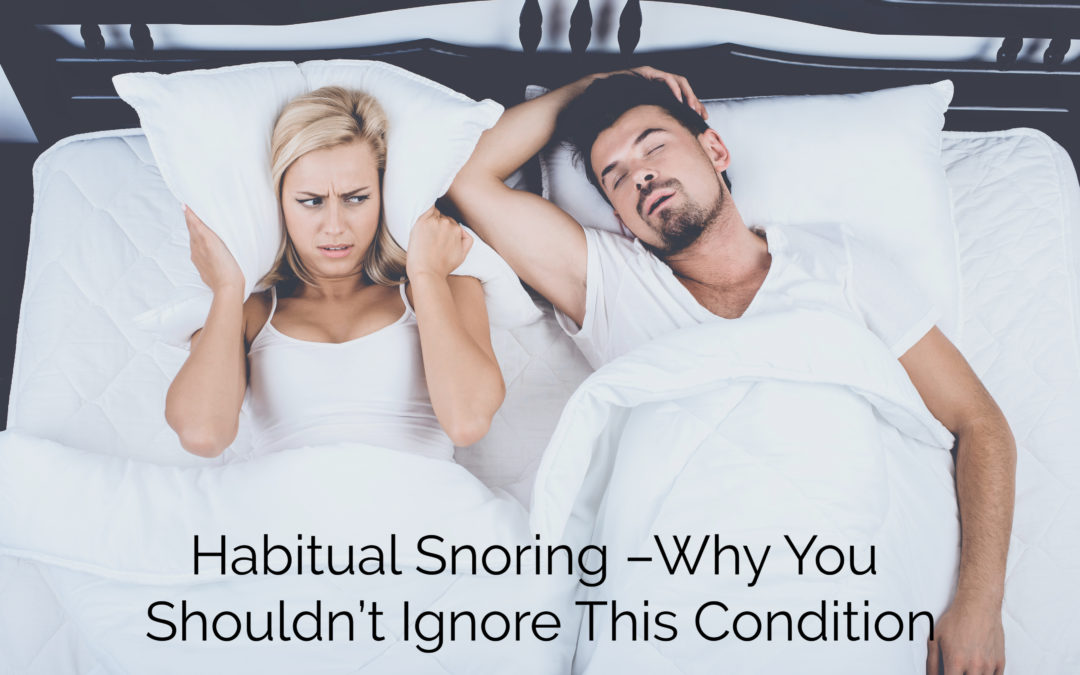By: Lauri Leadley, CCSH, RPSGT- Clinical Sleep Educator|Sleep Coach

Lauri Leadley, CCSH, RPSGT
A lot of people come to me seeking treatment for snoring. The problem is compounded among couples because snoring affects the sleep partner as well.
However, what most people don’t know or realize is that snoring is a real health issue. So, my focus as a sleep coach extends beyond just helping people deal with snoring – my aim is to also educate and create awareness about the health risks of snoring.
Here’s why snoring should not be ignored.
90 million American adults experience occasional snoring. While in many cases the condition is not serious, if snoring happens on a regular basis then there is cause for concern as it could indicate an underlying health issue.
Some of the serious health risks include; cardiovascular disease, obesity, diabetes, sleep deprivation, and other sleep disorders such as sleep apnea, and insomnia.
Important Facts about Snoring
- 37 million American adults experience regular snoring.
- Snoring is not gender specific and is prevalent among all age groups.
- Snoring can also be caused by anatomical abnormalities such as enlarged tonsils and nasal polyps.
- Respiratory infections which cause inflammation of the throat and nose, can also lead to snoring.
- High risk groups include those who are overweight, males, and older people.
- Primary health risks most commonly associated with snoring include heart disease and daytime dysfunction.
- Obstructive sleep apnea is common among one-half of those people who snore loudly.
5 Serious Health Risks Linked to Snoring
There is no doubt that snoring is a nuisance and a disruption to the snorer and their partner. However, habitual snoring should be taken seriously as it presents a set of health risks which cannot be ignored.
- Recent unexplained weight gain/obesity – Poor sleep quality can lead to hormonal imbalance in the body which can trigger excess weight gain or obesity. Excess weight around the neck, in turn, can lead to snoring and sleep apnea.
- Stroke – In snorers there is an increased risk of the narrowing of the neck arteries which supply blood to the brain; if the blood supply to the brain is poor or blocked, it can result in a stroke.
- Heart Disease – Poor sleep quality caused by sleep disorders such as snoring and sleep apnea can increase the risk potential for cardiovascular diseases such as hypertension and coronary heart disease which in turn can increase the risk of heart attacks and strokes.
- Diabetes – Poor sleep quality has a spill-over effect on various aspects of our health including increased risk of developing diabetes.
- Mental Disorders – In addition to affecting physical health, snoring can also impact our mental health. In most cases, snorers suffer from poor sleep quality which in turn can lead to decreased mental capacity, depression, mood swings, irritability, and anxiety disorders.
Health Risks Associated with Obstructive Sleep Apnea
Because sleep apnea is one of the primary sleep disorders associated with snoring, it is important to look at specific health risks the condition presents.
- Breathing interruptions caused by either complete or partial blockage of the airway which last more than 10 seconds while sleeping.
- Frequently waking up from sleep without realizing it and sleeping lightly because the body is focused on keeping the throat muscles tense to ensure uninterrupted airflow – this again leads to poor sleep quality.
- If obstructive sleep apnea is left untreated for long, it can lead to hypertension and increased risk of heart attack and stroke.
- Poor sleep quality impacts the quality of life of a person during active hours.
Treatment for Snoring
A professional sleep coach will first assess the condition and identify the triggers for snoring based on two key factors:
- Does the patient snore through the nose or the throat?
- In addition to snoring, does the patient have obstructive sleep apnea?
The patient will be advised to use an intraoral device or a mandibular repositioning device or MRDs (for throat snorers) or use a nose strip or chin strap (nose snorers).
Treatment options for throat snorers with mild to moderate obstructive sleep apnea include use of MRDs and continuous positive airway pressure device or CPAP therapy options. For patients with throat snoring and severe obstructive sleep apnea, treatment options include a wide range of positive airway pressure or PAP devices, masks, and accessories.
Snoring Issues
Habitual or regular snoring should not be ignored. It is the body’s way of informing us of a potential health risk.
The best course of action is to consult with a professional sleep coach who will be able to advise you about using snoring aids and devices which can help alleviate the condition, so you can finally get a good night’s “uninterrupted” sleep.
Valley Sleep Center – We Can Help You Sleep Better!
Is snoring affecting quality of sleep for you and your partner? If yes, we at Valley Sleep Center can help you. For a consultation with sleep coach Lauri Leadley, please email us at sleep@valleysleepcenter.com.


